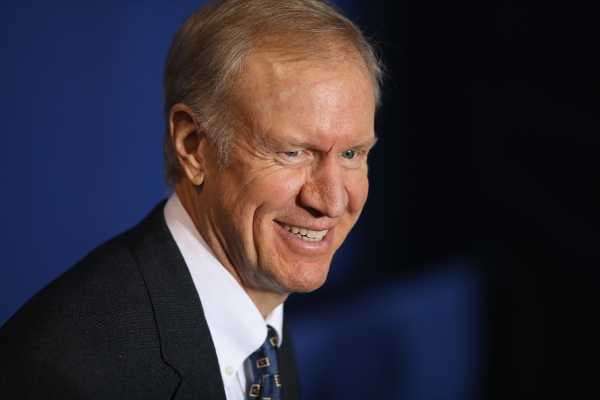
Illinois’s Republican Gov. Bruce Rauner eked out a narrow win in his primary battle against a conservative state lawmaker on Tuesday night.
The incumbent candidate declared victory even before media outlets felt comfortable calling the race, claiming the Republican ticket for November over challenger Jeanne Ives, who managed to tighten the race to single digits. The Associated Press called the race at 10:29 pm local time with Rauner up 3 points.
But while Rauner has won this fight, his battle for the general election is looking a lot more fraught. It’s clear Ives tapped into a frustrated conservative Republican voter base, railing on Rauner for having liberal views on abortion and LGBTQ rights and failing to stand up to the Democratic establishment in Illinois’s statehouse.
And as one of the most unpopular governor’s in the country, Rauner, an uberwealthy former venture capitalist, will face billionaire entrepreneur and Democratic gubernatorial candidate J.B. Pritzker in the general election, in a midterm election cycle that Democrats are more than eager to dominate.
A close race in the primaries only spells trouble for the incumbent Republican governor on the road ahead.
Rauner is incredibly unpopular and Illinois is in a state of financial crisis
Rauner, first elected in the 2014 Republican wave, has had a rough four years in Springfield. He ranks among the least popular governors in the country and has a lower approval rating than President Donald Trump — around 30 percent — in a state Trump lost by more than 20 points.
That’s in large part due to the state’s severe financial crisis, which has been decades in the making. Illinois’s bond rating is hovering one level above “junk” status, and the state went two years without a budget before finally passing one with a significant tax hike last summer. November will undoubtedly be a race about stabilizing the state’s financial situation and breaking Illinois’s long history of corrupt leadership (four of the past seven governors have ended up in prison).
Despite Rauner initially running as an outsider to challenge a corrupt establishment, the state hasn’t improved under his tenure. A bitter feud with the Democratic state House Speaker Michael “Boss” Madigan, the longest-serving member of any state or federal legislative body in US history — and arguably one of the most powerful politicians in the country — left the state without an annual budget for two years.
Lawmakers finally passed a budget in 2017 by overriding Rauner’s veto, but the state’s financial health is still grim. Illinois owes more than $15 billion in unpaid bills and has a pension debt of more than a quarter-trillion dollars — the highest in the nation.
In 2002, Madigan sponsored legislation allowing thousands of state workers to retire as early as age 50 and still take advantage of full pensions. State officials estimated 7,400 workers would take the one-time offer, but more than 11,000 did. That will cost the state an estimated $2.3 billion through 2045, according to Reuters.
To offset some of the debt, the state legislature’s budget included a 32 percent income tax hike — the highest in history — which Rauner has promised to roll back if reelected.
Rauner’s campaign has tried to push the blame to Madigan, with Rauner even telling reporters, “I’m not in charge” of the state. But there’s no question that the fiscal instability — and its impact on the state’s social services — has taken a serious toll on the governor’s approval rating, which has sunk to 31 percent, according to a January Morning Consult poll.
Rauner is also embattled in his own party for his liberal stance on some social issues. After he signed a law that expanded taxpayer-subsidized abortions for women covered by Medicaid and state employee insurance, his positions have become a major liability among conservative Republicans voters.
Rauner’s billionaire Democratic opponent has his own troubles
The incumbent governor’s Democratic opponent, J.B. Pritzker, has plenty of his own baggage.
A recent Chicago Tribune investigation found Pritzker and his brother Anthony Pritzker own several offshore shell companies and trusts where their money is stored. Those companies, combined with Pritzker’s decision to release only the first two pages of his personal income tax returns, have raised questions of whether the billionaire candidate is avoiding taxes as he advocates for a progressive income tax. (Pritzker told the Tribune the trusts are only for charitable contributions.)
But even so, the Democratic nominee is eager to oust the governor.
“[Rauner is] just not the right man for the job,” Pritzker told Vox in an interview. “He’s a guy who doesn’t understand the difference between business and government. People are feeling really let down by him.”
Pritzker clearly thinks he can come out on top, but his Democratic opponents believe his ties with establishment politics and personal finances will weaken the party’s chances to defeat Rauner come November.
In the contest between Pritzker and Rauner in January, the winner will be whoever convinces Illinois voters he can revitalize the state’s economy and stay aboveboard while doing it.
Sourse: vox.com






